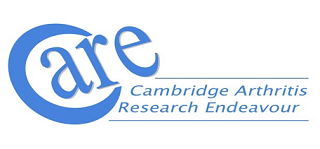Cambridge Arthritis Research Endeavour – CARE – has been researching rheumatological diseases, and their complications, for more than thirty years.
This has been an unprecedented time for the development of more effective treatments, especially for rheumatoid arthritis, psoriatic arthritis, juvenile arthritis, ankylosing spondylitis and even systemic lupus erythematosus. These include some of the most crippling kinds of disease. Patients who used to need wheelchairs because of such conditions are now a rare sight in our clinics. Many patients with SLE who would not have survived into their thirties and forties are now successfully working and raising families.
These advances are the results of intensive efforts by the international academic and pharmaceutical research community. Unsurprisingly, all this requires finance! Whilst CARE has been successful over its history in obtaining grants from government, national charities, and pharmaceutical companies, additional money is required to maintain an effective research team, and to initiate smaller “pilot” studies to establish a proof-of principle. This can then attract national funding for the larger studies needed to confirm pilot studies. For the unstinting support of the local community in allowing CARE to pursue these aims, the Trustees are extremely grateful.
CARE’s Aims
Support Research
To support rheumatology research in CambridgeshireSupporting Rheumatology Research
CARE tested many novel therapies at the earliest stages, including one of the original antibody treatments, developed in Cambridge, where the first patients in the world were given the drug under CARE’s sponsorship. This work continues and ensures that patients have early access to potentially effective treatments. This is most important for those with difficult-to-treat disease who haven’t responded to available treatments or have lost their initial response. CARE has sponsored laboratory-based research into the basic mechanisms which cause different kinds of arthritis. It’s this research which lays the basis for new” targeted” treatments, unlike the treatments of a previous era which were found by chance.
Provide Information
To provide reliable and accessible information to rheumatology patientsProviding Rheumatology Information
It is important to keep patients up to date on progress in treatments which might be of benefit. Likewise, feedback from the patient community on issues faced where treatments aren’t helping sufficiently is critical, such as fatigue, for instance. Close interactions with patients during clinical trials can highlight these aspects. CARE is also working on widening access to research by holding research clinics in under-served communities throughout East Anglia.
Local Research
To inform patients and their families/friends about local rheumatological researchLocal Rheumatological Research
Detailed studies of patients undergoing treatment can also reveal who might get most benefit from a particular treatment, or are less likely to get side-effects. Again, careful studies of real patients are crucial to progress, and the CARE team specialise in this.
Promote Awareness
To promote awareness of rheumatological conditions among student doctorsPromote Rheumatological Awareness
The donations gifted to the charity permit us to employ a full time senior research doctor who is dedicated to supporting the clinical research studies that we perform. These doctors have usually completed their rheumatology specialist training and before applying for a consultant post, spend a one year fellowship with us to serve patients in our research studies. Doctors from the UK, Europe, Australia, New Zealand and Ireland have joined us to date. This helps us to advance our research for patient benefit and raise the international profile of our research. These doctors also help to teach medical students from the University of Cambridge; thereby inspiring them to choose a career in rheumatology and hopefully succession plan for a bright future for rheumatology research and clinical care
